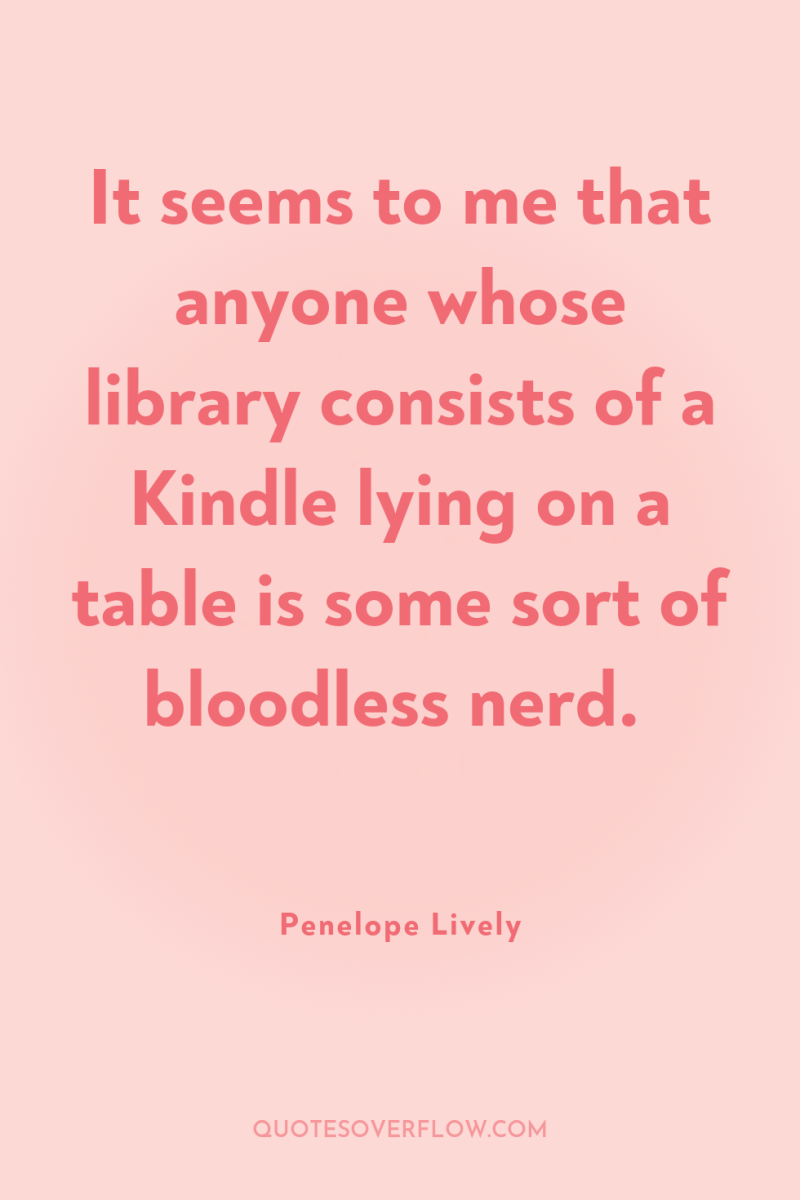1
I never told her the other story, in which she stars, in which she is always the heroine — a romanticized story full of cliché images in which I am telling her all the things there has not been enough time for, in which we are doing all the things there has not been time for…Penelope Lively

2
It seems to me that anyone whose library consists of a Kindle lying on a table is some sort of bloodless nerd.Penelope Lively
3
Children are infinitely credulous. My Lisa was a dull child, but even so she came up with things that pleased and startled me. 'Are there dragons?' she asked. I said that there were not. 'Have there ever been?' I said all the evidence was to the contrary. 'But if there is a word dragon, ' she said, 'then once there must have been dragons.Penelope Lively
4
I control the world so long as I can name it. Which is why children must chase language before they do anything else, tame the wilderness by describing it, challenge God by learning His hundred names.Penelope Lively
5
We open our mouths and out flow words whose ancestries we do not even know. We are walking lexicons. In a single sentence of idle chatter we preserve Latin, Anglo-Saxon, Norse; we carry a museum inside our heads, each day we commemorate people of whom we have never heard. More than that, we speak volumes — our language is the language of everything we have read. Shakespeare and the Authorised Version surface in supermarkets, on buses, chatter on radio and television. I find this miraculous. I never cease to wonder at it. That words are more durable than anything, that they blow with the wind, hibernate and reawaken, shelter parasitic on the most unlikely hosts, survive and survive and survive.Penelope Lively
6
But however minimal, however threadbare, it (collective memory) is ballast of a kind. We all need that seven-eighths of the iceberg, the ballast of the past, a general past, the place from which we came. That is why history should be taught in school. to all children, as much of it as possible. If you have no sense of the past, no access to historical narrative, you are afloat, untethered; you cannot see yourself as a part of the narrative, you cannot place yourself within a context. You will not have an understanding of time, and a respect for memory and its subtle victory over the remorselessness of time.Penelope Lively
7
The past is our ultimate privacy; we pile it up, year by year, decade by decade, it stows itself away, with its perverse random recall system.Penelope Lively
8
The power of language. Preserving the ephemeral; giving form to dreams, permanence to sparks of sunlight.Penelope Lively
9
The question is, shall it or shall it not be linear history. I've always thought a kaleidoscopic view might be an interesting heresey. Shake the tube and see what comes out. Chronology irritates me. There is no chronology inside my head. I am composed of myriad Claudias who spin and mix and part like sparks of sunlight on water. The pack of cards I carry around is forever shuffled and re-shuffled; there is no sequence, everything happens at once. The machines of the new technology, I understand, perform in much the same way: all knowledge is stored, to be summoned up at the flick of a key. They sound, in theory, more efficient. Some of my keys don't work; others demand pass-words, codes, random unlocking sequences. The collective past, curiously, provides these. It is public property, but it is also deeply private. We all look differently at it. My Victorians are not your Victorians. My seventeenth century is not yours. The voice of John Aubrey, of Darwin, of whoever you like, speaks in one tone to me, in another to you. .Penelope Lively
10
So now we are young still but a better sort of young.Penelope Lively
11
Charlotte views her younger selves with a certain detachment. They are herself, but other incarnations, innocents going about half-forgotten business.Penelope Lively
12
I have a print - you can buy them at the Victoria and Albert Museum - of a photograph of the village street of Thetford, taken in 1868, in which William Smith is not. The street is empty. There is a grocer's shop and a blacksmith's and a stationary cart and a great spreading tree, but not a single human figure. In fact William Smith - or someone, or several people, dogs too, geese, a man on a horse - passed beneath the tree, went into the grocer's shop, loitered for a moment talking to a friend while the photograph was taken but he is invisible, all of them are invisible. The exposure of the photograph - sixty minutes - was so long that William Smith and everyone else passed through it and away leaving no trace. Not even so much of a mark as those primordial worms that passed through the Cambrian mud of northern Scotland and left the empty tube of their passage in the rock. I like that. I like that very much. A neat image for the relation of man to the physical world. Gone, passed through and away. .Penelope Lively
13
Giving presents is one of the most possessive things we do, did you realize that? It's the way we keep a hold on other people. Plant ourselves in their lives.Penelope Lively
14
Unless I am a part of everything I am nothing.Penelope Lively
15
We all act as hinges-fortuitous links between other people.Penelope Lively
16
The consideration of change over the century is about loss, though I think that social change is gain rather than loss.Penelope Lively